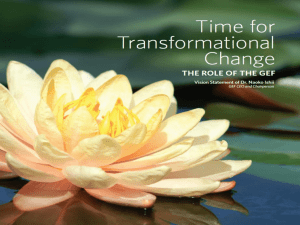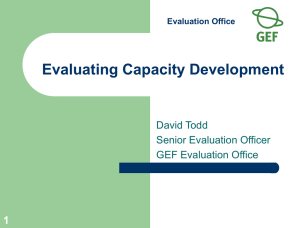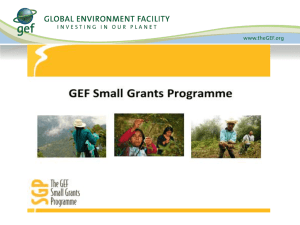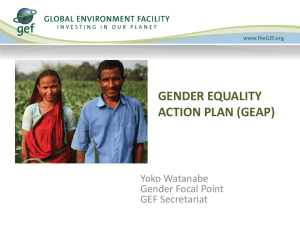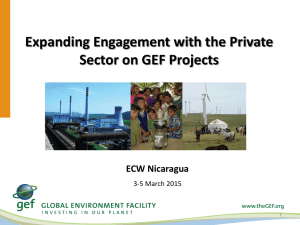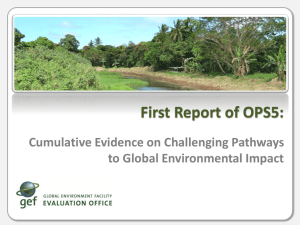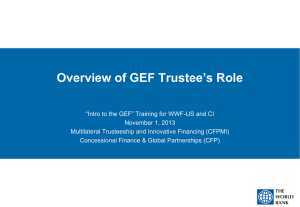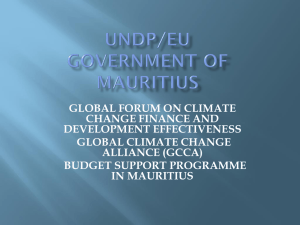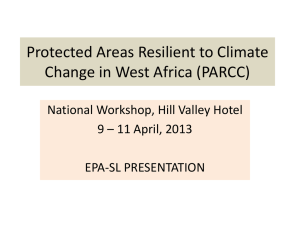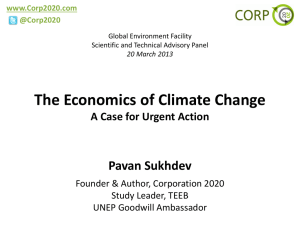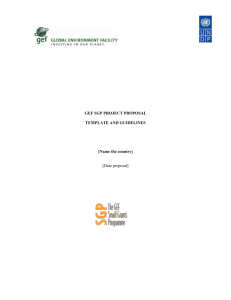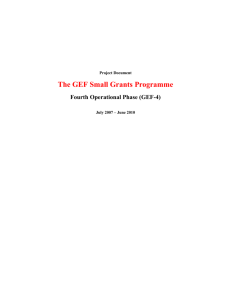Focal Area and Cross Cutting Strategies * Chemicals
advertisement
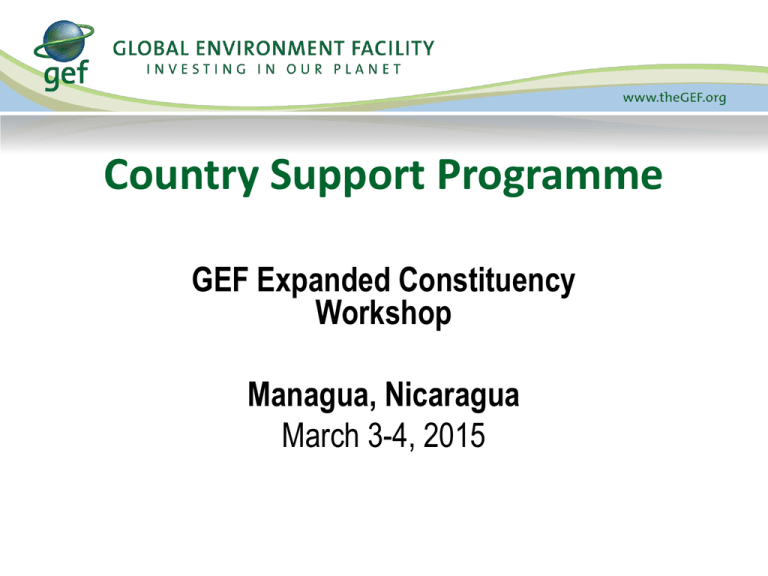
Country Support Programme GEF Expanded Constituency Workshop Managua, Nicaragua March 3-4, 2015 Country Support Programme (CSP) The Country Support Progamme (CSP) is the main tool for carrying out Country Relations Strategy and has the following components: GEF National Portfolio Formulation Exercises GEF National Dialogues GEF Workshops GEF Constituency Meetings GEF Introduction Workshops Pre-Council Meetings for Recipient Countries National Portfolio Formulation Exercises (NPFE) • In GEF-6 the objective of this activity is to further help GEF OFPs to engage relevant national stakeholders and line ministries, in the planning process for developing national priorities for GEF support, including specific project ideas • Voluntary and not a pre-requisite for GEF funding • Final NPFD to be submitted to GEF – who will review and provide comments as appropriate. GEF National Dialogues • National Dialogues continue to be a strategic tool for promoting the incorporation of the global environment concepts into national thinking, accounting and regular work. • They bring together a wide array of national and local level stakeholders to discuss and understand how protecting the global environment is key to their national interest • National Dialogue are organized at the request of the OFP. May include a component on GEF6 programming GEF Workshops - ECWs • The purpose of Expanded Constituency Workshops (ECW)is to keep GEF OFPs, Convention FPs and other stakeholders, (CSOs) abreast of GEF Strategies, policies and procedures • ECWs are organized by GEF Secretariat with up to 7 participants –GEF FPs, 4 Convention FPs and CSO rep. • GEF may also design and organize other workshops to facilitate work on trans-boundary collaboration, regional programming and other issues based on thematic or geographic need. GEF Constituency Meetings • During GEF-6 Constituency Meetings will continue to be the main tool for the Council Members to engage their Constituency members in the preparations for decision making at the GEF Council • Each constituency may request 2 meetings per year – before each Council meeting • Organised at the request of the Council Member – who prepares the agenda and chairs the meeting • GEF responsible for all logistical arrangements GEF Introduction Seminars • GEF Introduction Seminars (previously GEF familiarization seminars) are organized to provide necessary information and training to new GEF Agency staff, Convention Secretariat staff, new GEF Focal Points and selected stakeholders on the GEF-6 strategies, policies and procedures. • The seminars also reach out to other audiences that are critical for the GEF to succeed e.g line ministries, media, private sector where possible. • Organized by the GEF Secretariat once a year in Washington DC. Pre-Council Meeting for Recipient Country Constituencies • The purpose of these meetings is to enable Council members from recipient countries to meet immediately prior to the Council Meeting to exchange views, positions and perspectives in relation to the Council documents and to receive clarification from Secretariat staff, as necessary. Agency Stakeholders Global Environmental Facility (GEF) United Nations Development Programme (UNDP) United Nations Office for Project Services (UNOPS) What is SGP? A program, which: • Believes that local solutions to global environmental problems exist. • Supports community-based initiatives and action. • That the process of implementation leads also to poverty reduction and local empowerment. Nature of SGP Grants • Planning grants: $2,500 • Small grants projects: up to $50,000 • Strategic grants: up to $150,000 • Local CBOs, NGOs, communities, civil society organizations; • Review and approval of proposals done at country level through National Steering Committee SGP Country Governance Structure National Steering Committee (NSC): • Country driven • Capacity-building for CSOs • Review and approval of projects • Mobilize resources, link SGP to policy and planning • Majority non-governmental • OFP and UNDP CO are ex-officio • All volunteers of various expertise •Tenure 2 years; exceptionally renewable SGP Country Governance Technical Advisory Group (TAG): • Get more involvement; • Expert review group; • NGO experts, academia, reps of Conventions • Focal Points; • Quality of proposals. SGP Country Management SGP Country Team: National Coordinator (NC) • • • • Competitively selected UNOPS contracted Implements decisions and policies of NSC Primary supervisor is SGP Global Manager on programmatic matters. Programme Assistant (PA) • • Competitively selected and UNOPS contracted Supports the NC and reports to the NC SGP Global Management Central Programme Management Team (CPMT) • Provide guidance on meeting the commitments of SGP to GEF • Maintain global coherence • Raise global co-financing • Link country outcomes to global environmental governance • Global Manager and DGM plus focal area experts that also serve as Regional Focal Persons SGP Steering Committee •GEF Secretariat (Chair), Oficina de UNDP-GEF (NY) and the GEF CSO Network • Provides strategic guidance SGP as a Global Programme • 22 new countries joined during OP4 (2008-2010) • 8 new countries started up during 5th Operational Phase (OP5) from 20102014 for a total of 136 • More than 19,000 projects globally Integration with National Efforts • Development of the Country Programme Strategy (CPS) a. endorsed by the NSC and shared with the GEF OFP and Convention Focal Points; b. links with other planning and priority processes in the country • Involvement in NPFEs, NBSAPs, NAPAs, etc. a. input SGP lessons learned b. position CSO/community stakeholders into strategic roles • Linkages with MSPs/FSPs SGP OP6 Programming directions In GEF-6, SGP will have a three-pronged approach • Focus on globally recognized ecosystems • Set up institutional and financial support mechanisms • Systematically develop the capacity of local and national civil society stakeholders. SGP OP6 Programming directions For greater efficiency in the use of limited resources and to promote mainstreaming and scaling up, SGP country programmes can select from a set of four (4) multi-focal strategic initiatives: • Community Landscape and Seascape Conservation • Climate Smart Innovative Agro-ecology • Low Carbon Energy Access Co-benefits • Local to Global Chemical Management Coalitions Partnerships • • • • • • • • • Grantees National Governments State/Local Governments Regional Governments Bilateral aid Corporations Multilateral agencies Foundations NGOs Thank you for your attention Questions?
